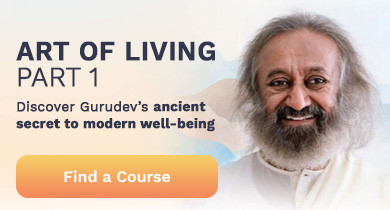In ancient language of Sanskrit, the word sutra literally means a thread or string that holds things together. Metaphorically, it refers to an adage or maxim. The Yoga Sutras comprise a major work that was compiled by Patanjali over two thousand years ago. The practical wisdom they contain regarding the practice of Yoga remains as relevant today as when they were written. Guided by a single thread, a kite can glide and soar to amazing heights. The Yoga Sutras of Patanjali are life’s threads, each one rich with knowledge and techniques to guide the mind and help bring ones very being into full expression. You can learn and apply the ancient wisdom of the Yoga Sutras by following this series over the next several months, beginning today with the first sutra — Discipline of Yoga.
Discipline of Yoga
When you are thirsty, do you need a rule telling you to drink water? When you are in nature, do you need discipline to appreciate its beauty? No. If you are thirsty you drink and if the view is beautiful you appreciate it. No discipline is required for enjoyment or quenching your thirst. Discipline arises when something may not be enjoyable at first, but you know it will bear fruit over time that will be enjoyable. When you are centered in your Self, you are in joy, peace and happiness. There is no discipline there. But when this is not so, the mind is busy and “wags its tail” all the time. Discipline is essential to calm the mind so it can come back to the Self. The fruit of discipline is joy and happiness.
There are three kinds of happiness. From Sanskrit, these are sattvic, tamasic and rajasic. Sattvic happiness is not so enjoyable to begin with, but always leads to joy. This is the long-lasting happiness which is felt after a certain discipline. Tamasichappiness only appears to be so but is actually misery from beginning to end. Lack of discipline is tamasic happiness. Rajasic happiness seems enjoyable in the beginning but ends in suffering. It is caused by following the wrong discipline. So, discipline is essential for sattvic happiness. To bear what is uncomfortable is discipline. It need not be uncomfortable all the time. But if it is uncomfortable, you need discipline to bear it and move through it.
Now, what does discipline do? Discipline unites your Self and all the loose ends of your existence. When you are awake, you are constantly engaged in activities of the senses. Even when you sleep and dream the same memories come and you are never calm and quiet. But when you unite all the loose ends of your existence, you become the object of your perception. The whole purpose of Yoga is to be unto one Self - to make you whole. You may be looking at someone. Become aware of your eyes which are looking. Then become aware of the mind that is looking through the eyes. Now close your eyes and retrieve your mind from the five senses. Become aware of your whole body, your heart and the core of your existence - the “I” that is you. Rest and relax there, right there. Abiding there in the form and nature of the seer is Yoga. You are abiding in the form and nature of the seer whenever you experience joy, ecstasy, bliss or happiness. Otherwise, you are involved in one of the activities of the mind.
Five modes of consciousness arise in you. First, the mind wants proof, pramaana, for everything. Have you noticed this? You may be in Switzerland. The proof is that you can see the Swiss Alps. This is pratyaksha, and means that which is obvious or can be experienced. Anumaana is another kind of proof. It means something that is not so obvious, but which can be guessed. Then there is aagamana, the scriptures. They are believed because they are written. The mind works this way. You are constantly looking for proof of something.
Yoga is when you drop this. Only then can you abide in the Self. Retreating from the activity of the mind wanting proof releases you from it, and brings you back to the Self. Your senses may fool you. You could be taken to Austria, see snowy mountains and think you are in Switzerland. But the feeling of “I am and I exist” is beyond proof. Abiding in the Self does not need proof. Anything that can be proven can be disproven, but truth is beyond proof or disproof. You can neither prove God, nor can you disprove Him. Proof is connected with logic, and logic is limited. It is the same with enlightenment and love. Love cannot be proven or disproven. Behavior is not proof of love. Actors and actresses may act the emotion of love, but they need not feel real love. Proof is one of the main things you are stuck with in this world.
Much of the time you impose your views, ideas and feelings on others and think this is how things are. This second activity of mind is viparyaya. You may have an inferiority complex, and therefore consider someone’s behavior to be arrogant. Actually, they are not arrogant or disrespectful. It is because you do not respect yourself that you think others do not respect you. Proof is of no importance when viparyaya dominates, and logic fails. Correct information appears briefly, but only incorrect information sticks in the mind.
The mind’s third modulation is vikalpa. It is a sort of hallucination. There may be some thought, but it is not true. However, something hovers in the mind. It could be a pleasurable fantasy or a baseless fear. Perhaps you are sixty years old and fantasize about what it would be like to be sixteen again. Or, you may be apprehensive you will have an accident and die tomorrow. Both are vikalpa. Sleep, nidra, is the fourth activity. The fifth and final modulation is smriti, remembering past experiences. When you are awake, are you in any of these modulations? If so, that is not meditation. That is not Yoga.
How do you contend with the overpowering nature of these activities of mind? It is through abhyasa and vairagya, practice and detachment. An effort is needed to relieve you of the five modulations, to bring the mind to the present moment. This effort is abhyasa. You can start by being determined that you are not going to be interested in any proof or knowledge. If the mind asks for proof or knowledge, just observe it and relax. Let things be the way they are. If the mind is on some fantasy, know it is happening. By knowing you are fantasizing it drops off, freeing you. This moment is so new, so fresh and so total. This moment, again and again and again, is abhyasa.






























